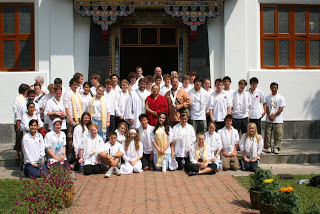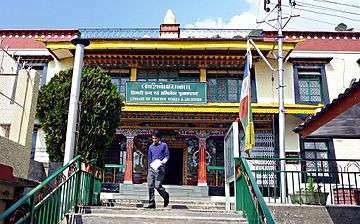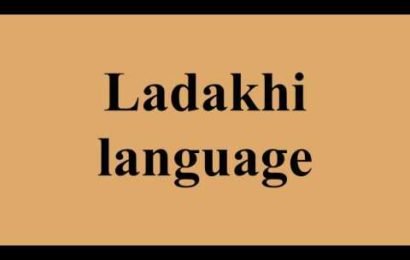Rangjung Yeshe Institute
Tibetan and Translation
Summer Classical Tibetan Course:
June 12 – August 9, 2019 (Eight weeks including four days of orientation)
The Classical Tibetan summer program is offered on three levels: Beginning, Intermediate, and an Advanced Classical Tibetan Reading Seminar. The level of intensity of the summer Tibetan courses is high and the courses require considerable time and effort in order to meet class requirements and academic expectations. However, students who successfully complete the summer courses will be well on their way towards a high degree of proficiency in classical Tibetan.
Beginning Classical Tibetan
This intensive Classical Tibetan course is designed for beginning students with no prior knowledge of classical Tibetan. The program provides a thorough grounding in the basics of classical Tibetan, including a complete introduction to classical Tibetan grammar. As such the course provides a strong foundation for reading various types of Buddhist literature in Tibetan.
The course begins with an extensive overview of the grammar after which students begin to read a variety of texts, including philosophical treatises and practice texts. Students are lead through the texts in a detailed and gradual manner, so that even complete beginners are able to understand their meaning while building a basic vocabulary and gaining familiarity with the practical application of the grammar.
For more information, please download the detailed course syllabus.
Intermediate Classical Tibetan
This summer intensive is offered for intermediate-level students with two semesters of prior study of classical Tibetan. The course assumes familiarity with the fundamentals of Tibetan grammar, including the eight cases and their associated particles, common grammatical structures and verb tenses, along with knowledge of Buddhist terms and vocabulary.
For more information, please download the detailed course syllabus.
Advanced Classical Tibetan Reading Seminar
This summer intensive is a graduate- and undergraduate-level seminar focusing on readings in Tibetan supplemented with related secondary source readings. The course is divided into two four-week sessions with two different visiting professors. This course is offered for students with at least two years of prior study of classical Tibetan and assumes some knowledge of Buddhist philosophy and history. It is designed to help students further develop both their language proficiency and the research skills needed to conduct research at the MA or PhD level.
For more information, please download the detailed course syllabus.
Application Fee Reduction
Applications to the classical Tibetan summer courses that are submitted between October 1 and October 31 will receive a fee reduction worth ten percent of tuition towards the cost of the chosen summer course. This fee reduction applies to early applicants of all nationalities. Read more about the Early Application Fee Reduction here.
Accreditation:
The course is accredited at the Centre for Buddhist Studies as follows:
- For Beginning Classical Tibetan: Classical Tibetan I and II (6 credits total)
- For Intermediate Classical Tibetan: Classical Tibetan III and IV (6 credits total)
- For Advanced Classical Tibetan Reading Seminar: Advanced Readings I (RTIB 501: 6 credits total)
Admission:
The Beginning and Intermediate Classical Tibetan programs have a maximum enrollment of 15 students. The Advanced Classical Tibetan Reading Seminar has a maximum enrollment of 12 students. All applications are subject to approval by the Centre for Buddhist Studies.
Students applying to the Intermediate and Advanced programs must present documentation of prior Classical Tibetan studies at a university or from a similar recognized program.
Read detail: https://www.ryi.org/programs/summer-intensives/classical-tibetan
Lotsawa Rinchen Zangpo Translation Program
Tibetan Language and Translation Class
Lotsawa Rinchen Zangpo Translator Program (LRZTP) exists through the kindness of Lama Zopa Rinpoche, with the aim of training students to become interpreters of the Buddha Dharma, and is a Project pending Affiliation with the FPMT Foundation for the Preservation of the Mahayana Tradition.
The purpose of LRZTP’s two-year Tibetan Language program is to produce graduates who have a high level of spoken and written Tibetan in order to qualify for the LRZTP Interpreter Program. The successful completion of these consecutive programs will allow students to skillfully convey the Teachings of Lord Buddha to the world, the source of happiness for all beings.
Our aim is to provide the students of LRZTP with an immersive learning experience of Tibetan culture and language through specialised curriculum as well as guest speakers, workshops and our famous Lotsawa momo parties! In addition to the daily classes and sessions with conversation partners, visits to culturally relevant sites as well as collective viewing and discussing of documentaries and live Dharma teachings will be used to further students’ interest and knowledge.
Interpretation techniques will be taught by professional interpreters during the additional two-month Interpreter program. It will be held directly after the completion of the two-year Tibetan Language program. This specialised interpretation program offers students the unique and rare opportunity to graduation with highly regarded skills for their professional careers.
LRZTP also offers intensive courses of six weeks for those who wish to be able to converse in Tibetan and deepen their Dharma practice by reading texts and listening to Dharma teachings in Tibetan.
The Lotsawa Rinchen Zangpo Translator Program is a specialized Tibetan language program which provides students with a broad knowledge of colloquial and dharma Tibetan language, dharma knowledge, and interpreting skills.
LRZTP7 will be a two-year in-class program and – for those students who graduate – a further two years working as an apprentice interpreter in an FPMT dharma center. The in-class program will start in October 2015, finishing in October 2017, and is open to those who wish only to study for the first two years, as well as to those who are interested in the further two years training at a dharma center.
The course will be divided into 10 modules of eight weeks each. The first year will focus mainly on colloquial Tibetan, and the second year will focus on dharma Tibetan.
During the course the students will have daily classes with our teacher Franziska Oertle, one-on-one conversation classes with native Tibetan speakers, daily listening comprehension classes, and dharma classes.
The second year of the program offers interpreter-training classes with Tica – a professional UN interpreter – and a module on Buddhist philosophy taught by Gavin Kilty.
First year
- Conversation class
- Listening comprehension class
- Exams and assignments
- Dharma knowledge in English
Second year
- Class structure
- The topics of the second year:
- Module 8 – Introduction to dura and lo-rig taught by Gavin Kilty
- Interpreter training with Tica
In general
- Registration
- FPMT affiliated students
- Course fees
- Visa
- About
- Daily Schedule
- First and Second year Schedule
First Year:
The main goal of the first year of the program is to give students a firm base in colloquial Tibetan to such a level that they can hold basic conversations fluently and have a basic knowledge of Buddhist topics in English, which will serve as a basis for the classes that will be taught in the second year.
Conversation Class:
Conversation classes will take place every day for two hours at school in order to practice spoken Tibetan. In these classes students will practice what has been taught in the main class. Each student will have one-on-one classes with a conversation partner. All conversation partners will have training before the program starts in order to provide them with skills needed to teach students.
Listening Comprehension Class
The goal of this class is to improve students’ ability to identify words and structures and enhance memory and retention skills. The students will listen to recordings of sentences or conversations and will complete various assignments related to them.
Exams and Assignments
In order to keep a high standard of study and help students better retain what they have learned, there will be evaluating examinations every two weeks, and weekend assignments every other week. At the end of each module and there will be a concluding exam on all the material of the module. Also at the end of each year there will be concluding exam. Students’ overall marks will be 50% final exam scores and 50% small exams and assignments. At the end of the two years only students who have passed the final first- and second-year exams will be applicable for placement in a dharma center.
Dharma Knowledge in English
On Friday every week there will be dharma teachings in English in order to provide students with knowledge of dharma and dharma terms in English so that when students study these topics in Tibetan in the second year they will already have a general understanding. The teachings will be on the following topics: Lam rim, lo-jong, tenets, mind and mental factors, grounds and paths, tantra, and Buddha-nature.
Second year
The main goal of the second year is to teach “dharma Tibetan” and provide students with a foundation of interpreting and translating skills. The daily schedule will be the same as in the first year with daily conversation classes and dhrama teachings on Fridays. We will have two special guest teachers – Gavin Kilty and Tica. Gavin Kilty will teach an introduction to dura and lo-rig, and Tica will teach interpreting skills.
Class Structure in the Second Year
In the second year the students will learn dharma vocabulary related to certain dharma topics. For each topic there will be texts or sections of texts, and sometimes also teachings. The teacher will explain the written grammar, colloquial structures, and vocabulary of the teachings.
Topics of the second year:
Module 6 & 7: Lam Rim
Module 8: Dura and Lo-rig (taught by Gavin Kilty)
Module 9: Tenets
Module 10: Lo-jong and Tantra
Module 8 – Introduction to Dura and Lo-rig – Taught by Gavin Kilty
We are blessed to have Gavin Kilty onboard to teach Module 8. Gavin Kilty will teach the Collected Topics (dura), Mind and Mental-Factors (lo-rig), and the basis of Debate.
Collected Topics: A collection of topics that set out basic Buddhist ontology, presented from the philosophical view of the Sautrantika school of tenets. The topics are presented through the medium of debate, and so the first is the basics of logic and debate.
This is followed by topics on the varieties of existence such as:
- Permanent and impermanent phenomena
- The five sensory objects and their divisions
- The divisions of functioning phenomena
- Hidden and manifest phenomena
- Conventional and ultimate truth
- Cause and effect
- The three times, etc.
It will also include the basic types of perception as taught in lo-rig (Ways of Perceiving), and if time allows, the fundamentals of the four main Buddhist tenets.
Interpreter Training with Tica
From the second half of the second year Tica will teach interpreting methods for a few hours each week. This course will teach retention skills, note taking techniques, practice methods, and more.
Registration
In order to register for LRZTP7 you must do the following:
- Fill in the registration form included in the required documents.
- Sign the LRZTP student agreement.
- Pay the deposit of US$200. This deposit is non-refundable should the applicant decide to cancel.
There are only 20 places in LRTP7. Applicants who apply when there are already 20 registered students will go on the waiting list.
FPMT Affiliated Students
There are two ways of participating in LRZTP7 – either as an FPMT affiliated student or as a freelancer. FPMT affiliated students must commit to work in an FPMT center for two years after graduating from the first two years of the program. Freelance students do not have this obligation. Course fees are subsidized for FPMT affiliated students .
Course fees
FPMT affiliated students – (approximately ) 7170 USD
Freelance – (approximately ) 8300 USD
Course fees include lunch, school materials, and one-on-one conversation classes.
Visa
for information about Visas please contact ltzrp108@gmail.com
Daily Schedule
| 09:00 – 10:00 | Library class |
| 10:15 – 10:30 | Meditation and prayer |
| 10:30 – 11:30 | Class |
| 11:30 – 11:45 | Tea Break |
| 11:45 – 12:45 | Class |
| 12:45 – 13:45 | Lunch break |
| 13:45 – 14:35 | Conversation class 1 |
| 14:35 – 14:45 | Small break |
| 14:45 – 15:35 | Conversation class 2 |
| 15:35 – 15:50 | Tea break |
| 15:50 – 16:05 | Meditation |
| 16:05 – 16:50 | Listening comprehension class |
Short time Tibetan Course
Training in Speaking Tibetan
Learning alone is not enough; you will need to put into practice what you have learned. That is why we will provide you with conversation classes with native Tibetan speakers to practice your colloquial Tibetan. These classes are based on the material learned in the classes with the English speaking teacher – Julia Wilson from LTWA. For each session of conversation class, we will prepare a work sheet to accompany the lesson. It will have questions, drills, games and language exercises.
The majority of the conversation partners are already working in the afternoons in our two year interpreters training program. They have experience in teaching Tibetan to non-Tibetan speakers and they are hired based on the criteria of having the following three qualities – knowledge in Tibetan, good morality and, above all, a kind heart.
Upon completing the course, students will have the vocabulary and structures allowing them to have everyday conversations in Tibetan (talking about studies, jobs, introducing oneself and one’s family, food, cooking, shopping, weather etc.). Basic Dharma vocabulary will also be provided. Students will be able to use all three tenses in Tibetan and learn basic concepts of Tibetan grammar.
What are the prerequisites?
There is no prior knowledge required to register for the course, we will begin from the basics and progress systematically. Those who have already learned Tibetan will likely find it beneficial to review the basics and fill in any gaps in their knowledge.
When?
The short intensive Tibetan language for Dharma course will begin on Monday April 1 and finish on Friday May 24, 2019, a total of eight weeks. Attendance is Monday to Friday.
Course Structure
Classes will be held from Monday to Friday. In the morning they will start at 11.00 with two hours of intense conversation classes with native speakers (one on one). Native speakers will represent various dialects of Tibetan thus exposing the students to the variety of Tibetan speech. Each of these classes will be based on the material previously learnt in the main class and each will have a special “conversation sheet.” At 1.00 students will be invited for lunch at school. After lunch, for two hours, the main classes will be taught by Ms. Julia Wilson, translator at the LTWA, Dharamsala. Students will be expected to write quizzes and small exams to test their progress during the course and at the end of it. Upon completing the course they will be issued certificates of graduation.
In addition, we have the written materials as audio recordings spoken by Tibetan native speakers so the students can listen to the words and sentences and practice along with the recordings. We have SMR flashcards prepared for the course and use Google drive to exchange notes, materials and other stuff.
Where?
Our classroom is located in the Lotsawa Rinchen Zangpo Translator Program School, Rato Chuwar Labrang, Session Rd. (near the Men-Tsee-Khang Institute), Dharamsala, 167215, Himachal Pradesh.
Course Fees
Course full fee is 650 USD. This includes the classes, teaching materials, tea and lunches. It does not include accommodation. The school does not provide accommodation either.
We have a special offer to students from India. Owing to the kindness of the Khyentse Foundation we can offer a considerable discount to up to 10 Indian students wishing to take the course. The discount is 500 USD, thus students will be required to pay only 150 USD. This applies only to Indian students. They will be required to commit for the whole two months of the course.
This course is for the beginners, it provides basics for further pursue of education in Tibetan language. LRZTP will organize intermediate and advanced course in the future, so if anyone wishes to continue, they are welcome. Alternatively, students may in the future take up our long 2-year Tibetan language and Dharma course for translators and interpreters (the nearest one beginning in the latter half of 2020).
Payment of the fees happens in two stages:
- 200 USD is paid through a link provided on our website. This is a non-refundable deposit.
- The remaining 450 USD (or 50 USD in the case of Indian students eligible for the discount) will be paid in Indian rupees either in cash or by bank transfer.
- For Indian citizens, as the overall payment will be 150 USD only, please contact us directly.
Students will sign a student agreement proving they understand and accept the conditions of LRZTP and the course. They will also be required to sign the Ethical Policy of FPMT (Foundation for the Preservation of the Mahayana Tradition).
If you have any questions about the program, you are welcome to read the frequently asked questions page or contact the course coordinator Alejandro Garcia: lrztp.jr@gmail.com
Read detail: http://www.lrztp.org





